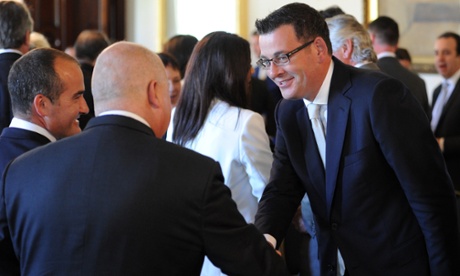
Tony Abbott appears to be softening his insistence that the $3bn in federal funding earmarked for Melbourne’s East West Link cannot be used for any other project, after an extraordinary lunch held on Friday to discuss infrastructure.
The South Melbourne lunch was attended by the prime minister, the federal treasurer, Joe Hockey, the Victorian premier, Daniel Andrews, the Victorian treasurer, Tim Pallas, and the Victorian opposition leader, Matthew Guy, the Age reported. It was reportedly organised by the radio broadcaster Neil Mitchell.
Before last Saturday’s election Abbott declared it a “referendum” on the cross-city toll road and tunnel project, which Labor promised it would axe. Abbott has consistently said that the $3bn promised for the link could not be used for any other purpose and that the commonwealth would not fund public transport projects such as commuter rail.
Victorian Labor’s transport priorities are a Melbourne CBD rail project and the removal of 50 dangerous level crossings.
On Friday, Abbott said he would look at ideas proposed by Victoria’s new government “on their merit”.
“If they’ve got other proposals that they want to put to us, by all means put them but we want East West Link built and there’s $3bn of federal money that is put aside for East West Link when the Victorian government finally comes to its senses,” he said. Guy told ABC radio the state Liberal Party remained committed to the $17bn link.
Andrews has vowed that the new government will “hit the ground running”, but almost a week after the election, counting continues in critical seats and the upper house, which one Labor official described as an unresolved “dog’s breakfast”.
Labor sources told Guardian Australia the party was claiming the so-called sand-belt seats of Bentleigh and Frankston in the city’s south-east. Only the inner city electorate of Prahran remained unclear, although Labor believes it will be won by sitting Liberal member, Clem Newton-Brown.
The Victorian Electoral Commission has not finalised the result in any of the three seats. On Friday afternoon, Newton-Brown’s lead over Labor’s candidate in Prahran, Neil Pharaoh, had shrunk to 57 votes.
Labor believes it is on track to win 47 seats in the 88 seat parliament, a workable majority but far from a landslide.
Before the election, the then Coalition government had a majority in the upper house, the Legislative Council.
Now it remains unclear which of the micro parties that did elaborate preferences deals will win critical seats, with fortunes swinging from hour to hour. Counting for the upper house is due to be finalised on 16 December.
Andrews is seeking to put the long-running dispute between the former government and paramedics behind him as quickly as possible.
On Friday, the entire board of Ambulance Victoria resigned – as Andrews demanded before the election – and agreement was reached with the paramedics’ union on most outstanding issues. Pay issues would be decided at the Fair Work Commission, Andrews said.
Guy, the sometimes combative former planning minister, told ABC radio he would not discuss the reasons for the Coalition being defeated after a single term in office. They would be analysed in a formal review, he said.
Guy, 40, is the Liberal party’s third leader in less than two years. He represents generational change, replacing Denis Napthine, who is 62. The new National Party leader, Peter Walsh, is 60, but his deputy is the newly-elected Steph Ryan, just 28. Guy said he would attempt to hold the coalition together.
The Nationals lost the seat of Shepparton to the independent Suzanna Sheed, who achieved a 32.5% swing, and almost surrendered the supposedly safe seat of Morwell to Labor.

